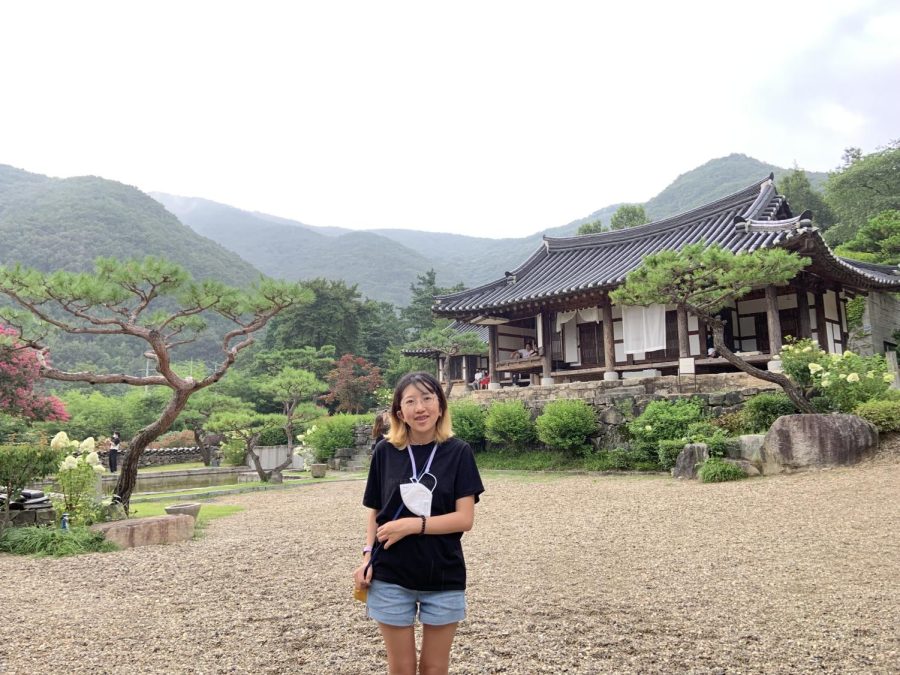How “Squid Game” helped me embrace my Korean heritage
November 8, 2021
When “Squid Game” was released on Sept. 17, 2021, globally on Netflix, it was ranked number one in viewership in over ninety countries. The nine-episode show quickly became a global phenomenon, highly acclaimed by many critics, and achieved status as Netflix’s most-watched series to date.
The television series follows fictional characters trapped in poverty and debt who are invited to play brutal childhood games that result in death in order to win a 45.6 billion Korean won prize, (approximately 38,724,800 US dollars).

These childhood games are ironic because of their simplicity. The games and their rules are very direct and easy to follow. However, one small mistake will lead to their elimination, or more directly put, their death. Due to the fact that I had played many of the games portrayed, I was intrigued by my memories of the games shown on an entertainment service as big as Netflix. Red Light, Green Light is a popular game in the United States, but it is also known by its original name, Mugunghwa Kkoch-i Piot Seumnida, which I would play with my cousins whenever my family visited Korea. Another game, Tug of War, is played all around the world and was another part of my childhood. Other games in the show, including the Dalgona (Honeycomb game), were a special part of my parent’s childhood, as well as mine. I remember enjoying the treat from the streets in South Korea, as well as drinking a Dalgona coffee at a cafe. Now, I scroll through TikTok watching people making the snack and attempting to cut out the shape. All of the games represent my family’s culture and my childhood.
When I was in elementary school and as a young child living in a small town, I believed that the country of South Korea was not a very well-known country. It was just a small peninsula, barely visible on my school classroom’s world map. My peers would always assume I was Chinese or Japanese, and when I corrected them, they would ask whether I was from North Korea or South Korea. Even though I thought that people would know that normally North Koreans were not allowed in the United States, I began to realize that was not the case.
Being a South Korean growing up in the United States was not painful, contrary to how it is written or viewed in many novels and films about foreigners in America. However, I did have odd experiences as an outsider. Perhaps it was because of the lack of education Americans had about my community. It was nothing different than what other immigrants and people of color experience; no one would be able to pronounce my Korean name, which led me to change it towards the end of my Kindergarten year. Students would tease me about my food. I never considered that they were being mean; after all, they were kids who were most likely curious. However, I sometimes felt distanced from the rest of the students at my school. Throughout my elementary to middle school years, there were nearly no Korean peers in my classrooms. Especially in the first few years of my elementary school, the majority of my classroom was nearly all white students. I felt that I was a minority.
In the middle of the second grade, Psy’s “Gangnam Style” became widely known, with students following the dance moves and memorizing rap lyrics. Even though “Gangnam Style” shook the world by maintaining the most viewed music video on Youtube for several years, South Korea was never fully considered a global power in culture. People began to know about South Korea towards the latter two years of my middle school years, especially through the success and worldwide recognition of K-pop, especially groups BTS and Blackpink.
In eighth grade, the movie “Parasite” was also given recognition after winning the Palme d’Or, the highest award given at the prestigious Cannes Film Festival. A few months later, it won four Academy Awards, including Best Picture.
South Korea was no longer an invisible country in a global arena. My friends started asking me about Korean culture, and the number of those interested in learning the Korean language sharply increased. I was very excited and proud to see my culture represented in so many countries and social media platforms. People’s reactions to each “Squid Game” episode now pop up in my YouTube feed, and I am glad to see that my close friends liked the show.
“Squid Game” is more than just a show depicting a group of people playing games and dying if they lose. It presents an emotional journey of different characters with a variety of backgrounds that have led them to the point of risking their lives to earn a huge amount of money. It shows how the lives of people at the bottom of the wealth pyramid are lost quickly and easily as if their lives are equal to trash. “Squid Game” also explores the nostalgia of childhood in Korea, mixed with the everlasting and pressing issue of poverty. These factors generated the show’s popularity all over the world, and many viewers are fascinated by original and real-like characters to relate themselves to and root for.
Overall, “Squid Game” is a television series that describes characters as ourselves and portrays capitalism through brutality, as well as portraying the hidden message of the wealth gaps, which relates to all countries around the world. I believe that this series has brought out Korean culture to the center of our world. I hope that other Korean entertainment will also continue to do so.



